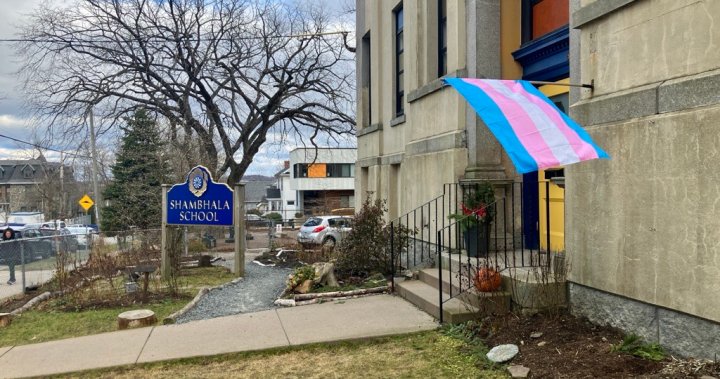In Halifax’s north end, the Shambhala School faces an ongoing challenge related to its support for the transgender community, particularly during Trans Awareness Month when the school publicly displays a flag emblematic of its solidarity. This year, the school community was dismayed to discover that the flag had been forcibly removed from its pole, marking the second consecutive year such an act of vandalism occurred. Noel McLellan, the school’s associate director, expressed that the heart-wrenching incident felt like an attack on their values and messages of inclusion. The situation prompted a clear sense of disappointment and distress among educators and students, who felt that the flag represented not just a piece of fabric but a crucial commitment to supporting marginalized communities.
In response to the act of flag desecration, educators at Shambhala acted swiftly to re-erect the flag. Wesley Pitts, a teacher involved with the Gender and Sexuality Alliance, underscored the school’s resilience by emphasizing that despite being pushed down, they aimed to rise again with strength. This resilient approach highlights a fundamental aspect of the school’s ethos—transforming visible acts of aggression into educational opportunities. Staff engaged with students to discuss the incident while instilling in them a sense of understanding and acceptance towards different identities, reinforcing that the destructive act reflected a narrow viewpoint not representative of the school’s values, which center on love and inclusivity.
The school leadership opted not to report the flag’s removal as a hate crime to police but indicated that future incidents might warrant such action. McLellan acknowledged the presence of transgender students within the school and expressed concerns about the psychological toll that such aggression could exact on their sense of safety and belonging. The flag’s removal as a visceral display of hostility is particularly concerning, as it could create an environment of fear for those students. Emphasizing the importance of community and safety, the school continues to prioritize a supportive atmosphere for all students, regardless of their identity.
In the broader context of Halifax, discussions about hate crimes have gained momentum since the establishment of the Halifax Regional Police Hate Crimes Unit in 2022. The formation of this specialized unit coincided with a dramatic uptick in reported hate crimes—from 13 cases in 2021 to an alarming 112 cases by 2023. The increase in hate incidents, which skyrocketed from a mere three reports in 2021 to 306 in 2023, has raised alarms about the community’s growing division and hostility towards marginalized groups. Representatives from the police force attribute this surge not just to a rising tide of intolerance but also to heightened awareness and reporting mechanisms for hate crimes.
A Police spokesperson outlined that the drastic rise in reports could be related to enhanced training and a concentrated effort to catalog incidents of hate, bringing them to the forefront of societal concerns. Despite the alarming statistics, officers encourage victims of hate to come forward—asserting that documenting experiences is critical for identifying patterns that can inform preventative measures against violence and discrimination. This call for reporting serves not only to create a more accurate picture of hate-related incidents but also aims to foster a collective dialogue on addressing hate in various forms within the community.
At Shambhala School, the desire to instigate constructive conversations extends beyond the schoolyard. School staff reflect on the need to engage in direct dialogues with those who oppose or challenge the visibility of transgender individuals, framing it as an opportunity to understand differing perspectives. Pitts articulated a vision for these conversations to foster an understanding by asking questions that can reveal the roots of opposition and misunderstanding surrounding transgender identities. This dialogic approach champions the idea that education, understanding, and empathy are paramount in bridging the chasm between conflicting viewpoints, ultimately seeking to transform animosity into acceptance.
In sum, the challenges faced by the Shambhala School serve as a microcosm of larger societal issues regarding inclusivity, acceptance, and the ongoing struggle against hate. As educators strive to create an accepting atmosphere despite acts of aggression, they embody resilience and commitment to fostering understanding among diverse community members. The significant increase in reported hate crimes in Halifax highlights an urgent need for collective action and dialogue around these issues. By advocating for openness and discussion, educators hope to transform conflict into learning opportunities, paving the way for a more inclusive future for all students.

